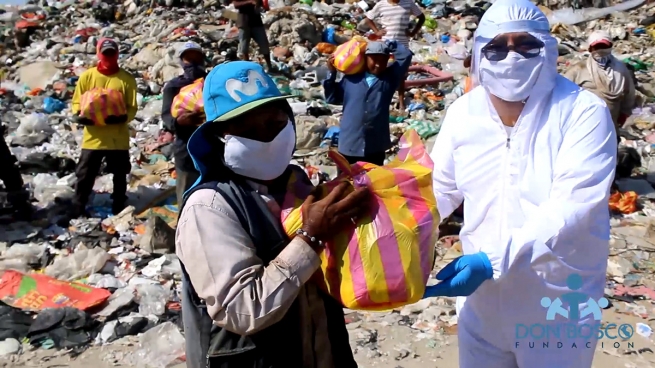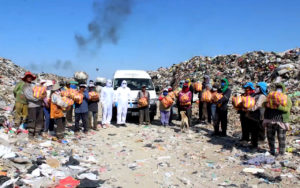PERU: Salesians help support those living and collecting trash at the Castile landfill

(MissionNewswire) Father Angel Carbajal and Father Pedro Da Silva, both Salesians in Peru, are taking care of families living amid the Castile landfill in Piura. The people living there are trying to survive by collecting plastic and cardboard from the garbage. Now, during the coronavirus pandemic, these are the people who are most at risk and those most forgotten.
Piura, a coastal city located in northern Peru, has the most coronavirus infections outside of Lima, the capital city. Hospitals in the city collapsed a month ago with fatal consequences, and now there is a lack of care for those who need it. During the pandemic, schools have been closed, but Salesian missionaries have continued to support the poorest among them.
When Fr. Carbajal and Fr. Da Silva visit the landfill they hear the suffering of people. People explain how family members have died, lacking oxygen. Others have approached the Don Bosco School in Piura to ask for something to eat because they have no food. The two Salesian missionaries have launched relief efforts and invited workers, parents, past pupils, friends and suppliers to help with the initiative.
 The aid operation began in Salesian oratories with the families of the hundreds of children who endured the lockdown and quarantine. From there, Salesians moved on to providing aid within the community and especially to the Castile landfill on the outskirts of the city.
The aid operation began in Salesian oratories with the families of the hundreds of children who endured the lockdown and quarantine. From there, Salesians moved on to providing aid within the community and especially to the Castile landfill on the outskirts of the city.
When Fr. Carbajal was asked why he took this risk to go there himself and not send others, he explained, “I did the same thing that Don Bosco would have done. It is pastoral charity in all its splendor. It’s the apostolic impulse that moves us to go towards those who need us.”
Relief efforts are still continuing within Salesian communities across Peru. Salesians are assessing the situation in their centers and communities and providing relief to those most in need.
Peru faces high levels of income inequality and has more than a quarter of its population living in poverty, according to the World Bank. Poverty levels are significantly higher in rural areas but urban areas struggle most with inequality, most notably metropolitan Lima. Poverty in the country is made worse by a shortage of productive farmland and a lack of job skills among women entering the workforce, as well as a lack of adequate housing, nutrition and education.
Peru has also been plagued by hunger and disaster. According to the World Bank, close to 25 percent of children in the country are chronically malnourished. Communities continue to rebuild after an 8.0 earthquake in August 2007 which killed more than 500 people in the central coastal cities of Chincha, Pisco and Ica and injured hundreds more. The quake destroyed close to 60,000 residential and commercial buildings, leveled hundreds of acres of farmland and left countless Peruvians without means of livelihood.
###
Sources:
ANS Photos (usage permissions and guidelines must be requested from ANS)
Salesian Missions – Peru
World Bank – Peru





